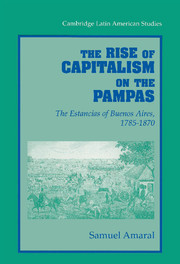Book contents
- Frontmatter
- Contents
- List of maps, figures, and tables
- Weights and measures
- Preface
- THE RISE OF CAPITALISM ON THE PAMPAS
- 1 Introduction
- PART I ESTANCIAS
- PART II CONDITIONS OF PRODUCTION
- PART III HUMAN ACTION
- PART IV RESULTS
- Appendix A Profit rates and present value
- Appendix B Probate inventories
- Appendix C Prices, exchange rates, and trade statistics
- Glossary
- Bibliography
- Index
1 - Introduction
Published online by Cambridge University Press: 30 March 2010
- Frontmatter
- Contents
- List of maps, figures, and tables
- Weights and measures
- Preface
- THE RISE OF CAPITALISM ON THE PAMPAS
- 1 Introduction
- PART I ESTANCIAS
- PART II CONDITIONS OF PRODUCTION
- PART III HUMAN ACTION
- PART IV RESULTS
- Appendix A Profit rates and present value
- Appendix B Probate inventories
- Appendix C Prices, exchange rates, and trade statistics
- Glossary
- Bibliography
- Index
Summary
The golden age of Argentine growth, from 1880 to 1930, has attracted the attention of countless scholars. Whether the intention is to explain what went wrong later or just to understand what was right then, there is no dearth of interpretations on how agricultural exports led a process of growth that put Argentina among the richest countries on earth by the end of that period.
Whatever the reasons for Argentina's failure to keep that pace after 1930, there is no question about that period of growth, expansion, and development (if this now outdated word means anything at all). It cannot be questioned either that the reasons behind it were a steady overseas demand for agricultural goods, improvements in transportation (railroads and shipping), technological change (ranging from the introduction of wire fencing and windmills to meat-packing plants), an increasing supply of labor (the massive inflow of migrants from southern Europe), and the incorporation of new lands into production. These are the factors usually mentioned, but institutional stability was a key element for it as well. A stable political system, a government with an increasing ability to enforce the law, and a clear set of rules were, in the long run (there were short-term setbacks), decisive for that expansion.
It has always been clear that institutional change was responsible for prosperity. For Mitre, the impressive growth that had taken place from 1810 to the 1870s was possible due to the removal of the colonial restraints in 1810. The amazing expansion of that period, however, became a sort of dark age for many scholars due to the brighter reflections of later affluence.
- Type
- Chapter
- Information
- The Rise of Capitalism on the PampasThe Estancias of Buenos Aires, 1785–1870, pp. 1 - 18Publisher: Cambridge University PressPrint publication year: 1998

